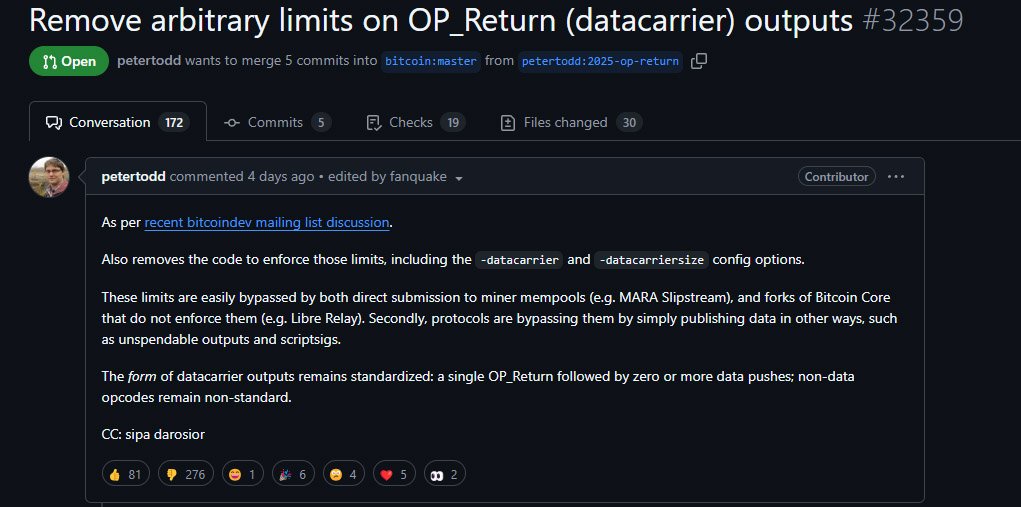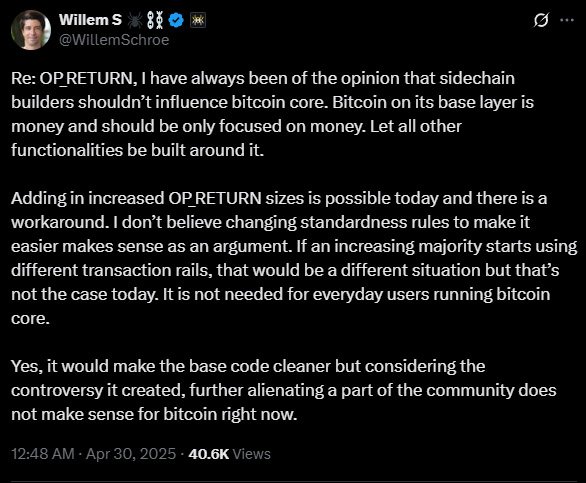A heated debate is raging in the Bitcoin community over a technical proposal that could change how data is stored on the blockchain. The issue is around the OP_RETURN function, a feature that lets users attach small amounts of data to Bitcoin transactions.
Currently this data is limited to 83 bytes, but a new proposal—Pull Request 32359—wants to remove that limit entirely. It sounds like a small change, but it’s got core developers, miners and users divided and has even sparked fears of a hard fork.
OP_RETURN was introduced in 2014 to allow small pieces of data—like timestamps or short messages—to be included in Bitcoin transactions.
Since this data isn’t meant to be spent, it doesn’t add to the UTXO (Unspent Transaction Output) set that all nodes must track. This made it a lightweight way to store limited information on the blockchain.
Over time the size limit was reduced to prevent spam, before settling at the current 83 byte-limit. Now some developers want to remove that limit completely.
The proposal is from Peter Todd, a well known Bitcoin Core developer, and is backed by Antoine Poinsot of Chaincode Labs. They argue the size limit is outdated and inefficient.


The proposal also includes removing “-datacarrier” and “-datacarriersize” config options, which allows for every individual node runner to control how they want their node to interact with transactions including OP_RETURN parameters.
Todd says the restriction has led some developers to use unspendable outputs as a workaround which bloats the UTXO set.
“The restrictions are easily bypassed by direct substitution and forks of Bitcoin Core,” he noted in GitHub comments. In other words, he believes the current limit isn’t stopping anyone—it’s just making things more complicated.
NFT initiatives like Ordinals and BRC-20 are actively utilizing methods to bypass this limitation, and upload huge chunks of data including JPEGs, audio and even complete computer games to the Bitcoin blockchain.
Related: Ordinals | A New Wave of Profit-Driven and Problematic Spam
Supporters think removing the limit will benefit sidechains and cross-chain bridges and even help Bitcoin compete with newer blockchains that offer more flexibility.
But not everyone is on board.
Jason Hughes, VP of Development and Engineering at Ocean Mining has been one of the loudest critics.
“Bitcoin Core developers are about to merge a change that turns Bitcoin into a worthless altcoin, and no one seems to care to do anything about it,” Hughes said.
He believes the change will flood the network with non-financial data and distract from Bitcoin’s core mission as a form of decentralized money.
Another critic Willem Schroe, founder of Botanix Labs says it’s not needed at all.
He says the situation is the same as it was before, because most people are still using the same transaction systems. He thinks devs should focus on Bitcoin as a monetary system, not a data storage platform.


Bitcoin Mechanic, another Bitcoin Core dev, says Bitcoin should not be used for arbitrary file storage, and every possible measure should be taken to ensure that.
Meanwhile Luke Dashjr, a long-time Bitcoin Core developer and network purist calls the proposal “utter insanity” and “an attack on the network”. He and others think lifting the limit will lead to spam and higher transaction fees as we saw during the 2014 OP_RETURN wars.
This debate has divided the community into 4 groups:
- Supporters: Removing the limit for technical and efficiency reasons.
- Opponents: Leave the limit or reduce it further to stop spam.
- Skeptics: Questioning the motivations behind the change especially from projects that will benefit financially.
- Moderation Critics: Censorship and bias in how the debate is being managed on GitHub and X.
#FixTheFilters is even trending now with influencers and developers accusing each other of hidden agendas.
The technical change is small but the social and philosophical implications are big. At the heart of it is what Bitcoin should be.
Should it stay a minimal, money-focused protocol or become a more flexible platform that supports other use cases including non-financial data storage?
Many critics of this change say deviating from being a sole monetary system is what Ethereum did, and that’s what spelled its doom.
It also brings up old fears of developer centralization with some community members feeling like big changes are being pushed through without enough discussion.
No one is calling for a hard fork yet but the level of disagreement is making many remember the 2017 split that created Bitcoin Cash. Back then, a similar ideological clash over block size resulted in a major network split.
Some are wondering if history will repeat itself.

